In this May 7, 2019, photo released by Cannabis Removal on Public Lands (CROP) Project, a group including U.S. Forest Service rangers, scientists and conservationists work to reclaim a so-called trespass grow site where nearly 9,000 cannabis plants were illegally cultivated. Authorities allege members of an international drug trafficking ring set up camp at the site months earlier. (Jackee Riccio/CROP via AP)
The Associated Press
LOS ANGELES (AP) - A month after two men were arrested at an illicit marijuana farm on public land deep in the Northern California wilderness, authorities are assessing the environmental impact and cleanup costs at the site where trees were clear-cut, waterways were diverted, and the ground was littered with open containers of fertilizer and rodenticide.
A group including U.S. Forest Service rangers, local law enforcement, scientists and conservationists hiked into the so-called trespass grow where nearly 9,000 cannabis plants were illegally cultivated on national forest land in the region known as the Emerald Triangle, for the marijuana that has been produced there for decades.
Authorities allege members of an international drug trafficking ring set up camp at the site as far back as 2015.
When deputies raided the remote clearing in the woods Sept. 9, they found hundreds of pounds of harvested marijuana, thousands of pounds of trash and more than 3 miles (4.8 kilometers) of plastic irrigation piping, according to the Trinity County Sheriff's Office. They also discovered bottles of carbofuran, a banned neurotoxicant used to kill rodents that also has been linked to the deaths of spotted owls, fish and mountain lions. A quarter-teaspoon can kill a 300-pound (136-kilogram) bear.
The case highlights some of the growing pains California has faced since kicking off broad legal sales in 2018. Its legal marijuana market has grown to more than $3 billion but remains dwarfed by a thriving illegal market, which rakes in nearly $9 billion annually. Limited resources mean officials can't keep up with all the illegal sites that are remnants of the outlaw era, when much of the pot for the U.S. black market came from the Emerald Triangle.
Experts say illegal sites like the one found in the Shasta Trinity National Forest, about 100 miles (160 kilometers) from the Oregon line, siphon valuable water, pollute legal downstream grows and funnel potentially tainted cannabis onto the streets.
'œThese places are toxic garbage dumps. Food containers attract wildlife, and the chemicals kill the animals long after the sites are abandoned,'ť said Rich McIntyre, director of the Cannabis Removal on Public Lands (CROP) Project, which is dedicated to restoring criminal grow sites on state and federal property in California. 'œWe think there's a public health time bomb ticking.'ť
CROP is a coalition of conservation organizations, tribes, elected officials, law enforcement agencies and federal land managers. Also lending its support is the legal cannabis industry, which says it's being undercut by the criminal market. Officials estimate that up to 70% of California's illicit pot comes from trespass grows mostly on public land.
'œWe see illegal grows as undermining the legal cultivators and manufacturers'ť by reducing tax revenue, said Lindsay Robinson, executive director of the California Cannabis Industry Association, a trade group. 'œWe're seeing untested and unregulated cannabis flooding the market.'ť
Black market marijuana is potentially dangerous because traces of the toxic chemicals used at grow sites are often found in the plants, she said.
'œIf you have an illicit grow upstream from you, and you're legal, that could end up tainting your product and prevent it from entering the market,'ť Robinson said.
CROP estimates that 9 billion gallons (34 billion liters) of water are diverted to trespass grows in California each year - a yearly supply for a city of 35,000 homes.
'œIn a state like California where water battles and drought are a way of life, that number is shocking,'ť McIntyre said. More than 60% of California's water comes from national forest land.
Authorities in 2018 made dozens of arrests at trespass grows while seizing hundreds of thousands of pot plants along with cash and guns. Criminal growers often use powerful firearms to protect their operation, McIntyre said.
'œThere are stories of people - hunters, fishermen, hikers - who find themselves down the barrel of an AK-47'ť after stumbling on illegal grow sites, he said.
The toxic chemicals were cleared from the Shasta site Oct. 16, and a 'œdecommissioning'ť cleanup - removing everything brought in by growers - should happen within a year. The goal is to restore illegal grows to pristine condition complete with reseeding and replanting, but that plan lacks funding.
CROP is lobbying for federal and state money to clean and reclaim an estimated 2,000 sites, a process it says could take seven to 10 years.
It's also pushing to increase the number of U.S. Forest Service rangers in California's national forests. Reclaiming each site costs an average of $40,000, requiring trained crews, law enforcement resources and often National Guard air support to remove tons of materials from remote areas, the group said.
The group has a supporter in Democratic U.S. Congressman Jared Huffman, whose Northern California district includes huge swaths of state and federal property.
'œWe've seen firsthand how illegal grow operations threaten visitors to our public lands, steal water and contaminate streams, and kill wildlife on a landscape scale,'ť Huffman said in a statement. He's introduced legislation that would identify the problem of trespass grows, expand land protections and free up funds to address it.
CROP is also pushing lawmakers to increase penalties for anyone who brings toxic chemicals to public lands. U.S. Attorney McGregor Scott said last year that federal authorities are concentrating their efforts on hazardous illegal grows.
Nine of every 10 illegal marijuana farms raided in California in 2018 contained traces of carbofuran, researchers at the Integral Ecology Research Center in northwestern California said last year.
That was a jump from chemicals found at about 75% of illegal growing operations discovered on public land in 2017, and it was six times as high as in 2012.
This May 7, 2019, photo released by Cannabis Removal on Public Lands (CROP) Project, shows the remains of a so-called trespass grow site where nearly 9,000 cannabis plants were illegally cultivated. Authorities allege members of an international drug trafficking ring set up camp at the site months earlier. (Jackee Riccio/CROP via AP)
The Associated Press
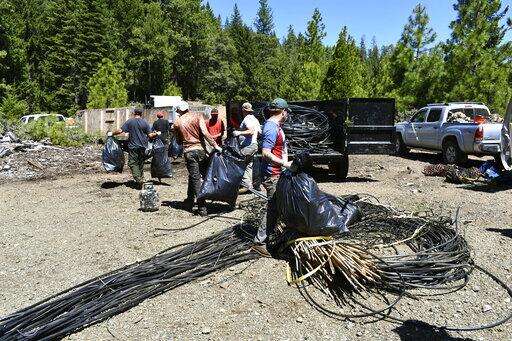
This May 7, 2019, photo released by Cannabis Removal on Public Lands (CROP) Project, workers from Trinity County RCD, Hayfork Watershed Center, Cannabis for Conservation, Watershed Stewards Program, and Dell' Arte International prepare trash to be air lifted for disposal from a trespass grow complex where nearly 9,000 illegally cultivated cannabis plants were found in the Shasta-Trinity National Forest, in Calif. Authorities allege members of an international drug trafficking ring set up camp at the site months earlier. Along with the hundreds of pounds of harvested marijuana, they also found thousands of pounds of trash and more than three miles (4.8 kilometers) of plastic irrigation piping, according to the Trinity County Sheriff's Office. (Jackee Riccio/CROP Project via AP)
The Associated Press
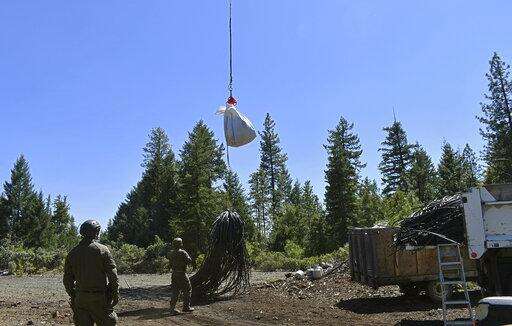
In this May 7, 2019, photo released by Cannabis Removal on Public Lands (CROP) Project, trash from a trespass grow complex where nearly 9,000 illegally cultivated cannabis plants were found is air lifted following a week-long reclamation of the site in the Shasta-Trinity National Forest, in Calif. Authorities allege members of an international drug trafficking ring set up camp at the site months earlier. Along with the hundreds of pounds of harvested marijuana, they also found thousands of pounds of trash and more than three miles (4.8 kilometers) of plastic irrigation piping, according to the Trinity County Sheriff's Office. (Dane Curry/CROP via AP)
The Associated Press

In this May 7, 2019, photo released by Cannabis Removal on Public Lands (CROP) Project, workers from Trinity County RCD/Watershed Center, along with Jackee Riccio, CROP Regional Field Director, center, prepare trash to be air lifted for disposal from a trespass grow complex where nearly 9,000 illegally cultivated cannabis plants where found in the Shasta-Trinity National Forest, in Calif. Authorities allege members of an international drug trafficking ring set up camp at the site months earlier. Along with the hundreds of pounds of harvested marijuana, they also found thousands of pounds of trash and more than three miles (4.8 kilometers) of plastic irrigation piping, according to the Trinity County Sheriff's Office. (Dane Curry/CROP via AP)
The Associated Press
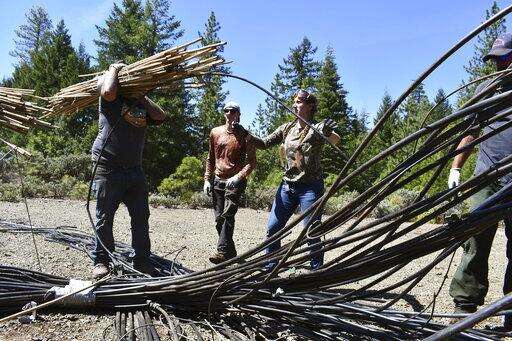
In this May 7, 2019, photo released by Cannabis Removal on Public Lands (CROP) Project, workers from Trinity County RCD/Watershed Center, along with Jackee Riccio, CROP Regional Field Director, third from left, prepare trash to be air lifted for disposal from a trespass grow complex where nearly 9,000 illegally cultivated cannabis plants where found in the Shasta-Trinity National Forest, in Calif. Authorities allege members of an international drug trafficking ring set up camp at the site months earlier. Along with the hundreds of pounds of harvested marijuana, they also found thousands of pounds of trash and more than three miles (4.8 kilometers) of plastic irrigation piping, according to the Trinity County Sheriff's Office. (Dane Curry/CROP Project via AP)
The Associated Press
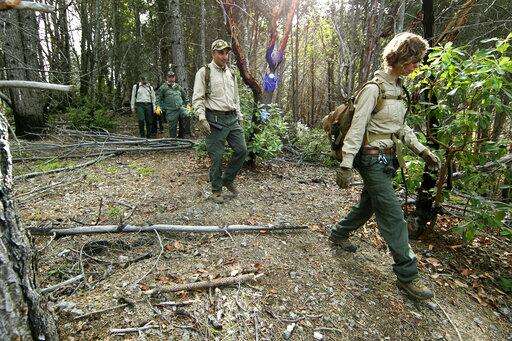
In this Wednesday, Oct. 16, 2019 photo provided by Cannabis Removal on Public Lands (CROP) Project, Integral Ecology Research Center (IERC) Dr. Greta Wengert, right walks with a group of U.S. Forest Service rangers, local law enforcement, scientists and conservationists into a so-called trespass grow where there were nearly 9,000 illegally cultivated cannabis plants. Authorities allege members of an international drug trafficking ring set up camp at the site months earlier. (Hung T. Vu/CROP Project via AP)
The Associated Press
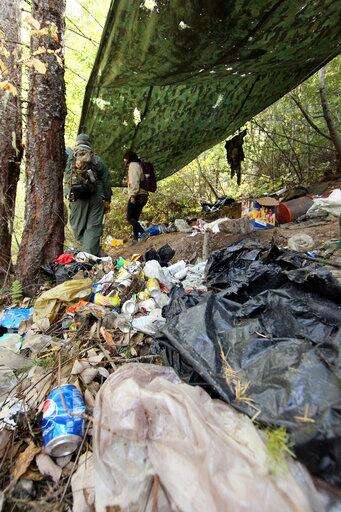
In this Wednesday, Oct. 16, 2019 photo provided by Cannabis Removal on Public Lands (CROP) Project garbage litters the ground at a so-called trespass grow where authorities found hundreds of pounds of harvested marijuana, along with thousands of pounds of trash and more than three miles (4.8 kilometers) of plastic irrigation piping in the Shasta-Trinity National Forest, in Calif. The cannabis was illegally cultivated by alleged members of an international drug trafficking ring who set up camp at the site months earlier.(Hung T. Vu/CROP Project via AP)
The Associated Press
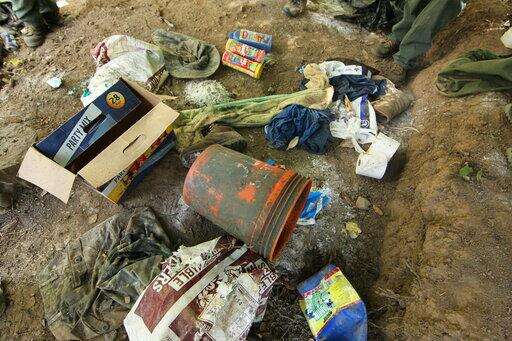
In this Wednesday, Oct. 16, 2019 photo provided by Cannabis Removal on Public Lands (CROP) Project garbage left at a cannabis grow site litters the ground at the Shasta-Trinity National Forest, in Calif. after U.S. Forest Service rangers, local law enforcement, scientists and conservationists hiked into the so-called trespass grow where there were nearly 9,000 cannabis plants. The cannabis was illegally cultivated by alleged members of an international drug trafficking ring who set up camp at the site months earlier. Along with the hundreds of pounds of harvested marijuana, they also found thousands of pounds of trash and more than three miles (4.8 kilometers) of plastic irrigation piping, according to the Trinity County Sheriff's Office. (Hung T. Vu/CROP Project via AP)
The Associated Press
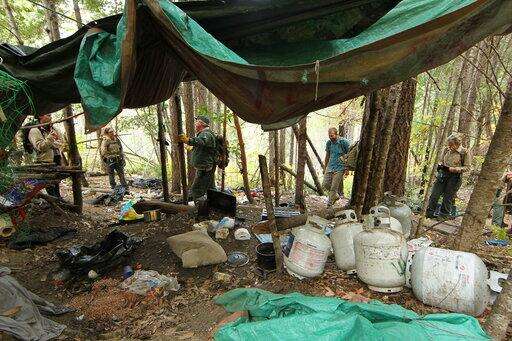
In this Wednesday, Oct. 16, 2019 photo provided by Cannabis Removal on Public Lands Project U.S. Forest Service rangers, local law enforcement, scientists and conservationists investigate a so-called trespass grow where there are nearly 9,000 cannabis plants in the Shasta -Trinity National Forest in Calif. The cannabis was illegally cultivated by alleged members of an international drug trafficking ring who set up camp in the Shasta Trinity National Forest about 100 miles (160 kilometers) from the Oregon border. Along with the hundreds of pounds of harvested marijuana, they also found thousands of pounds of trash and more than three miles (4.8 kilometers) of plastic irrigation piping, according to the Trinity County Sheriff's Office. (Hung T. Vu/CROP Project via AP)
The Associated Press
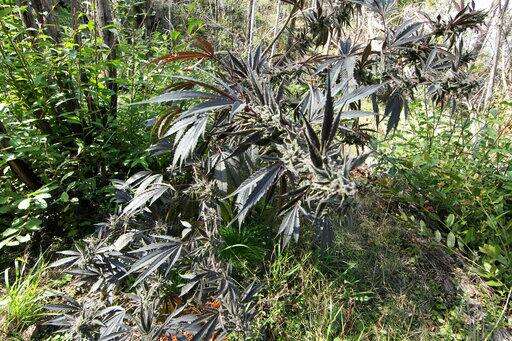
In this Wednesday, Oct. 16, 2019 photo provided by Cannabis Removal on Public Lands (CROP) Project a random marijuana plant is seen at a trespass grow where authorities found hundreds of pounds of harvested marijuana, along with thousands of pounds of trash and more than three miles (4.8 kilometers) of plastic irrigation piping in the Shasta Trinity National Forest, Calif. Authorities allege members of an international drug trafficking ring set up camp at the site months earlier. (Hung T. Vu/CROP Project via AP)
The Associated Press